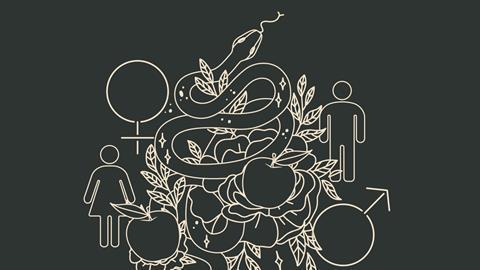In the wake of abuse scandals and the #MeToo movement, Megan Cornwell asks: is it time for Christians to re-evaluate Church teaching on gender roles?
The year was 2017. A groundswell of female indignation which, for millennia, has bubbled up and burst at different moments in history, was about to break like a fresh wave. After allegations that Hollywood producer Harvey Weinstein abused his power to sexually assault female actors, thousands of women shared their stories of harassment on social media.
#MeToo started trending, pursued a month later by #ChurchToo, as Christians added their voices, this time exposing misogyny on hallowed ground. From belittling comments to sexual assault, social media began to swell with tales of trauma. It seemed the floodgates had finally opened.
Half a decade has passed since the #MeToo movement exposed a Pandora’s Box of sexism and abuse and changed the way a generation thinks about power dynamics. In the interim years, we’ve witnessed efforts to shake up FTSE 100 boardrooms and speaking panels.
The media has devoted more column inches to socio-economic inequalities like the gender pay gap and injustices such as woefully low rape convictions. But what about the Church? How have Christians responded to the news that sexism and misogyny is thriving in some of our communities?
In particular, is Church teaching on male headship and female submission, alongside the belief that pastors must be male (known as complementarian theology) still viewed as biblical and therefore God’s best plan for human flourishing? Or have church scandals and abuse exposed it as the equivalent of Christian patriarchy: a system in which men hold and benefit from power to the exclusion, disadvantage and, often, abuse of women?
Beth Allison Barr, an evangelical history professor at Baylor University, Texas, spent eight years studying complementarian theology before writing Biblical Womanhood: How the subjugation of women became gospel truth (Brazos Press). Over Zoom, she shares her perspective with me: “It’s not that complementarianism causes abuse. It’s that complementarian theology, because it privileges male voices over female voices and excludes women from leadership, allows abuse to flourish.”
Dr Barr is referring in particular to the sexual abuse rife in the Southern Baptist Church (SBC), the complementarian denomination in which she was raised. In 2019, a joint investigation by the Houston Chronicle and San Antonio Express found that 380 pastors, leaders and volunteers had abused 700 in their care, many of whom were children. Among the distressing details of grooming, molestation and rape, a pattern emerged of victims being silenced and perpetrators being protected over a 20-year period.
The 2022 independent investigation into America’s largest Protestant denomination concluded that those who advocated for victims, demanding accountability and reform (many of whom were women inside the Church) “were denigrated as ‘opportunistic’, having a ‘hidden agenda of lawsuits,’ wanting to ‘burn things to the ground’”.
The horror of institutional sex abuse and cover-ups – which goes far beyond the SBC – has been compounded in recent years by scandals involving individual Christian leaders, many of whom hail from complementarian traditions.
From the machismo and bullying exhibited by Mark Driscoll to the predation of Rev Jonathan Fletcher and the spiritual abuse of Steve Timmis, the Church has reckoned with a dark underbelly of wrongdoing from its male pastors.
Some Christians have argued that individual sin or poor church governance lie at the heart of these problems, but this holds little sway with Barr: “I see the root cause of it as patriarchy,” she says frankly. “I think complementarianism is an offshoot of patriarchy, and what patriarchy teaches is that women are less than men.
“The evidence is overwhelming; how prevalent this is within evangelical spaces. This is not just a few people gone astray. This is deeply rooted and it has damaged thousands of people’s lives…this is a systemic problem that is going to require a systemic response.”
That response, according to Barr, must include a deeper analysis of the “ideology” of complementarianism, which she says positions men above women in a hierarchy that can lead to abuse.
Rather than male headship and female submission being God-ordained and biblical, as some churches teach, the historian says it is an unchristian idea that has existed for millennia and which has slithered into our interpretation of scripture.
“What is biblical,” she tells me, “is that patriarchy is a part of the curse and the curse is not what God desires for us. The curse is a consequence [of sin]. What happens is that women are ruled by men, and that was not what God said was good. Patriarchy isn’t the beautiful vision of the garden – it’s what happened in the Fall. And it has had serious consequences for humanity ever since.”
Equal but different
In 2011 the Fellowship of Independent Evangelical Churches (FIEC) in the UK voted to reaffirm its complementarian position, confirming in its revised statement on women in ministry: ”Churches belonging to the FIEC should not have a woman pastor-teacher or women elders.”
John Stevens, FIEC’s director, tells me this decision took place in light of wider debates concerning women’s roles in the Church. Denominations including the Baptist Union, Methodist Church and Anglican Communion had been ordaining women for years and FIEC wanted “to be very clear about where it stood”, he says. “FIEC is a reflection of its churches and the overwhelming majority of the churches wanted to maintain that [complementarian] position.”
FIEC isn’t alone in its view. Other evangelical movements in the UK, such as Newfrontiers, teach and practise complementarian theology. Many Christians assume that complementarianism is centuries old, due to its claims of biblical orthodoxy, but the word actually has its genesis in 1980s American evangelicalism.
It was coined by the founders of the Council on Biblical Manhood and Womanhood (CBMW) in 1988 who, a year later, produced the Danvers Statement. This summarised the complementarian position on gender, laying the blueprint for what would become our understanding of this theology in the UK.
Both the CBMW and Danvers Statement were a reaction to second-wave feminism, as its founders made clear. The freedom women sought outside the domestic sphere in the 1960s and 1970s was viewed as a threat to “the values of motherhood, vocational homemaking, and the many ministries historically performed by women”.
Before 2011, the FIEC’s governing body was using the Danvers Statement as a guide, but by the 2010s it was considered “out of date”, says Stevens, and “not an accurate reflection of complementarian theology”.
FIEC was looking for something simpler, which “identified the boundary line”, but made it clear that every other ministry was available to women.
According to Stevens, the fruit of complementarian theology ought to be churches in which women “feel safe, feel valued, feel able to flourish”, and he believes that the vast majority of the 635 FIEC churches are, if not achieving this, aspiring to it.
Where abuse exists within the broader Church, he identifies the root cause as the misuse of male power – “individuals mistreating and not acting in a biblical way” – rather than doctrinal error.
Nevertheless, just a few months ago on the FIEC podcast, Stevens directly addressed the question: Is complementarianism abusive? Why did he feel the need to do this? I ask.
One reason is that Christian safeguarding charity Thirtyone:eight mentioned the role of complementarian theology in its recent report on abuse scandals in British churches. Stevens wanted to demonstrate that misuse of power isn’t intrinsic to this theological position; that abuse also happens in churches that are egalitarian (placing no gender-based restrictions on women’s roles).
“It seems really important to highlight that, and try to make clear that complementarianism, properly understood with the full biblical perspective, isn’t an abusive position. Where abuse takes place, it’s not because of complementarianism – it’s because complementarianism hasn’t been properly understood,” he explains.
For Stevens, healthy complementarianism stresses that men and women are created by God to be equal, and that differences between the sexes are part of God’s good design and purpose.
But during the 28-minute podcast he describes the outworking of this theology as a spectrum, with “patriarchal” complementarianism at one end, which teaches that men are fundamentally designed to lead and women to submit, in all areas of life.
Personally, Stevens has adopted an approach in which male authority and female submission are confined to church leadership and the family, but within FIEC there is a variety of expressions.
“I think it’s part of the problem of this sort of spectrum,” he says, “and at a strongly patriarchal end, it is easy to see how biblical teaching that talks about wives submitting to their husbands can be overemphasised at the expense of the commands to, for example, husbands love their wives.
And there can be a failure to recognise the biblical teaching about equality in Christ and the need to extend respect and dignity to others.” Would he concede, therefore, that patriarchal complementarianism is abusive? “Well, it depends what you mean by abusive…I think it’s really important to defend the freedom of people to be able to practise their lives in a way that they believe is consistent with scripture.”
Stevens might distinguish between different models of complementarianism, regarding his own approach as “limited” and therefore different from “patriarchal” styles, but I am keen to dig a little deeper; some might say a benevolent dictatorship is still a dictatorship.
If egalitarians are correct that abuse occurs because of a hierarchy of power, then it’s an aspect of the debate that needs careful analysis. So I ask Stevens about the nuances he’s describing in his application of scripture. If there is a biblical precedent for male leadership in the home and the Church, why would male and female relationships in the workplace, for example, be any different?
And in his role as an elder at his local church, how does he ensure that his congregation doesn’t apply a complementarian understanding of gender roles to other contexts? “In many ways, it is clear biblical teaching,” he says. “The Bible doesn’t teach that in the workplace all men are leaders whereas all women are submitters. It’s perfectly normal to have a female boss who’s exercising authority and leadership in that particular context.”
Male entitlement
“Complementarians focus on difference, in terms of how power is distributed, and because of this, their claims of equality [between the sexes] are empty,” says Natalie Collins, a Christian gender justice specialist whose work includes training individuals and organisations to respond to male violence.
“If a Christian theologian stated that ‘black people cannot have leadership roles’, or ‘in the home, the white person has the final say’, it would be ludicrous to suggest that they believe in any form of racial equality,” she explains.
Collins believes complementarians like Stevens are misdiagnosing abuse when they prescribe a deeper, more biblical understanding of the differences between men and women, rather than a fundamental re-evaluation of theology.
She would agree, however, that abuse isn’t exclusive to complementarian environments, citing Bill Hybels, founder of the egalitarian Willow Creek Church in Illinois, as “a significant example”.
At the heart of abuse, wherever it is found, is the belief in “ownership” and “entitlement” over another person, she says. But in complementarian churches that culture is more common, because power is already heavily weighted in favour of men.
“And so while complementarian churches can create spaces where women who’ve been abused can feel safe, affirmed and cared for,” she says, “what they can’t do is challenge those core beliefs of ownership and entitlement, because complementarian theology, at root, says that men are spiritually afforded certain roles and responsibilities that women just cannot have.”
While it’s true that women in complementarian churches are prohibited from the majority of preaching and teaching, ‘ownership’ is a word that most adherents, I’m sure, would balk at.
What I have heard is the notion of protection; using male strength as a force for good, so I put this back to Collins. “That’s not how complementarian theology actually works in practice,” she replies, matter-of-factly. “In practice, women are not protected by men.
In fact, the most dangerous place for women, anywhere in the world, is in their own home with their own husband – in the Church and outside of it.”
Collins is referring to statistics on male violence. In England and Wales, two women are killed every week by a current or former partner. I know from previous research into domestic abuse that this crime is very much present in our churches too.
“I think there is something about the reality of human nature which is being denied in this assertion that this is about protection, and when we afford men greater power it’s because ‘God wants them to use their power for good’,” says Collins. “The reality is that if we understand the nature of sin in all of our lives, I don’t think that stands up to scrutiny. Actually, all of us should be seeking to submit to one another; all of us should be seeking to die to ourselves.”
Serving Jesus
Earlier this year, Rt Rev Rod Thomas, the Anglican Bishop of Maidstone, who is responsible for a group of complementarian CofE parishes, asked his congregations to sign up to the Maidstone Commitments.
These five promises were a response to Thirtyone:eight’s report into Emmanuel Church Wimbledon, where the abusive behaviour of its previous vicar, Jonathan Fletcher, had come to light.
Bishop Rod said he hoped the commitments would generate “fresh confidence in the culture of conservative or ‘classical’ evangelical churches”, adding that he did not believe they were “especially prone to the development of unhealthy cultures” but that it was “important for all churches that their leaders are more fully aware of how their ministries are being received.”
Among his suggestions for reform were clear channels to raise safeguarding concerns and the need to make a church’s complementarian position public.
Karen Soole, women’s ministry director for the Anglican Mission in England (AMiE), agrees that transparency can be helpful. Unlike the ‘resolution parishes’ governed by the Bishop of Maidstone, so-called because they passed a resolution requesting episcopal oversight from a male rather than a female bishop, AMiE is composed mostly of churches that have broken away completely from the CofE due to theological differences around same-sex marriage and women’s ordination.
AMiE might oppose female clergy but Soole tells me the society actively promotes women’s ministry, and a large part of her role is training and equipping women to serve and exercise their gifts.
“The fact that you may not be the ordained elder of the church doesn’t mean you can’t go into full-time Christian ministry,” she says, before admitting that, for women, the path is “less clearcut”. Soole is herself working in a voluntary capacity at Trinity Church Lancaster, where her husband (also unpaid) is the lead pastor. She organises conferences, provides one-to-one pastoral care for women and holds Bible studies, some of which are mixed-sex.
Soole thinks women’s ministry in egalitarian churches is “hugely undermined” by an “unconscious misogyny” that says ministry only matters if it is directed towards men.
While there may be some truth in this, gifted women with a vocation have historically looked outside of complementarianism to fulfil their calling. And while Trinity Church Lancaster appears to take seriously the need to disciple and equip both genders, not all complementarian churches do.
After all, when resources are limited, it makes logical sense to invest in the future leaders and church planters of their movements (ie men).
I ask Soole about the so-called stained-glass ceiling that dictates how far her gifts and skills can carry her within the Church. Compare this to the secular world, where there are potentially no limits to what she might achieve for God. “I don’t need a title. I don’t need an official position in the church. It’s just not what it’s about,” she replies. “It’s about us all using our gifts to the full to serve Jesus.”
Serving Jesus is one thing all Christians can hopefully agree on, but I can’t help thinking of the anointed women whose calling and gifts have been overlooked or quashed in complementarian churches.
Women who perhaps don’t have the luxury of working in unpaid ministry or who aren’t married to the pastor (and potentially afforded greater freedom to exercise leadership as a result). Heroines of the faith – such as missionaries like Jackie Pullinger, for example – whose ministries may not have flourished had they stayed here in the UK.
It may be wrong to label the inequality of opportunity within some evangelical churches as abusive, but a culture of investing in men at the expense of women has certainly caused harm, and potentially prevented growth.
From the early days of the Church, women have enjoyed freedom to exercise their gifts of leading and preaching in ways that often ran countercultural to the societal values and structures around them.
The parameters and scope of those freedoms have shifted over time, determined by decade and denomination but, in particular, the 1980s were a watershed moment for evangelicals.
Second-wave feminism in the 1970s threatened traditional views of women as wives and homemakers and led to the adoption of a theology that produced a clear delineation between gender roles. We are now witnessing the bad fruit of that reactionary position in our contemporary abuse scandals, egalitarians would argue.
Fourth-wave feminism, associated with the #MeToo and #ChurchToo movements, may now offer an opportunity to reflect anew on our understanding of gender roles, and how theology may have been used for evil rather than good.
We may not come to the same conclusion, but reform is needed in order for all our churches to become safe places that reflect the beauty and holiness of Jesus. But for those conversations to take place, women first need a seat at the table.







































No comments yet